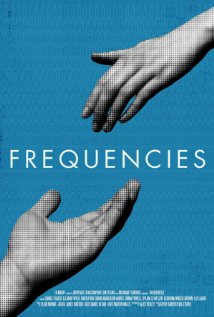Greeting or Serious Question? (Frequencies)
 So far this summer, I have reviewed a movie that was fun and entertaining but had junk science; and another movie, which had good science, but was drawn out and kinda dull. So, what about a movie with completely made up science?
So far this summer, I have reviewed a movie that was fun and entertaining but had junk science; and another movie, which had good science, but was drawn out and kinda dull. So, what about a movie with completely made up science?
Frequencies is an intriguing, multi-layered film made for almost no money. It demonstrates that writing combined with execution can result in an entertaining and thought provoking experience without anyone you’ve ever heard of.
The story dances around the concepts of fate and destiny. It is set in a world where “luck” is a quantifiable influence in people’s lives. This luck is expressed as frequency—like the frequency with which the universe will reorder itself for your benefit. Within the world of the film, frequencies are real, well known, and unchangeable. Their effect is well understood, but their origin is not. The main characters are a girl, Marie-Currie Fortune, and a boy, Issac-Newton Midgely (Zak), who meet as children in a private school for exceptional children. Among the science driven curriculum, the children are tested for their frequency. It should be noted, frequency is not I.Q. Zak is a super genius, in a school where that is average.
Marie (played by Eleanor Wyld) has the highest frequency ever recorded, exceeding the maximum limit of the scale. Zak (Daniel Fraser) has one so low that it is a negative number. As a consequence of her high frequency, Marie has no emotions, which gives the film some interesting interactions and memorable snippets of dialog. In her quest for a real connection, she conducts a series of experiments with Zak. Every year they stand next to each other for 60 seconds—the precise amount of time that passes before their frequencies generate an effect. The first time, it rains on Zak. Another year, Zak is nearly killed by luggage falling from a passing jetliner.
So it goes, until one day when Zak manages to extend that 60 seconds to 65. Fascinated, Marie meets him again, and life begins to change. And the film does something cool; it starts over. On the second time through, the story is told from Zak’s perspective. He has been conducting his own experiment, one that he thinks changes his frequency and hers. On the third play through the story, we learn that Zak’s higher frequency friend, Theo (played by Owen Pugh), has been helping Zak but not in the way anyone thinks.
The film is quiet but not slow. It takes a hold of the viewer with the question of “what is going on?” and leaves with the question, “what do I think that meant?” Unlike other, larger films that have tried to make the audience question the film and left them unsatisfied with dull pseudo intellectualism (I’m looking at you, Inception), Frequencies doesn’t leave you questioning the film. It leaves you, lightly, questioning the nature of the real world.
Frequencies is available through Netflix, Amazon, and other services. Go and watch it.
Say, “Thank you.”